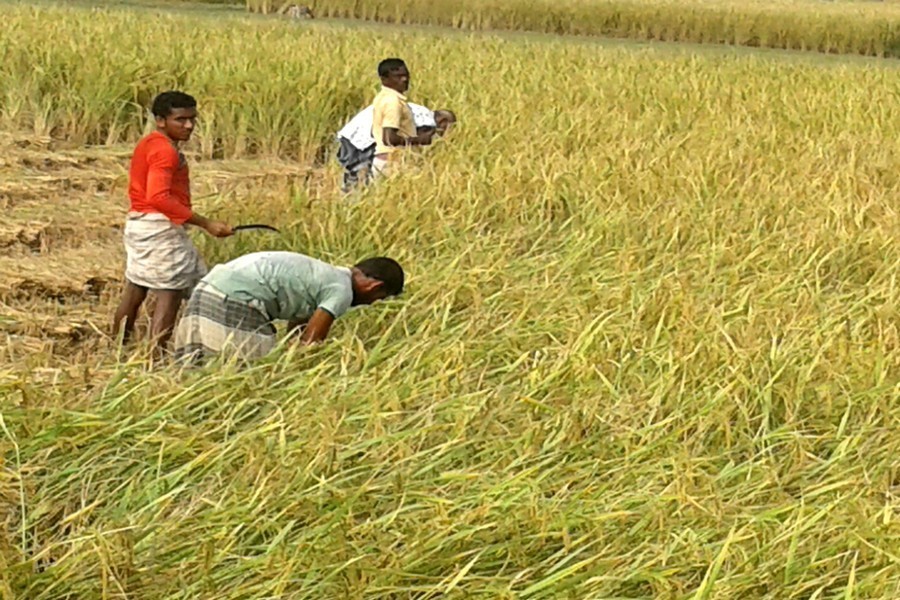
Published :
Updated :

Good harvest, unfortunately, no longer promises good fortune for farmers. Years of good harvest, especially of paddy, has established the reality, albeit grimly, that agricultural produce like any natural resource or manufactured product has to be matched by demand in order for the production to be fairly priced. Reports have it that this year, farmers across the country are facing hard time with their 'good harvest and bad price'.
The conflicting picture of bumper harvest and unfair prices has been, as though, an essential appendage to the country's agriculture sector. It is difficult to say when farmers last smiled in return for their hard toil by way of fair price. For the last consecutive years, the country has been experiencing good harvest in respect of most of the agro crops including paddy, but there were grievances of being denied the right price. The situation is not only unique in case of paddy alone. Horticulture produces such as potato, tomato and vegetables are also experiencing the same fate.
The case is particularly pathetic in respect of coarse paddy that caters to the demand of the low income groups. While asking price of coarse paddy is far lower than the finer varieties, market price this time is abnormally low to even make up for the cost of cultivation. Rough estimates say the coarse variety accounts for around 30 per cent of total paddy production annually implying that a large segment of farmers is dependent on its harvest.
It has been gathered that in little over two months price of coarse Aman paddy has slumped drastically by more than 25-35 per cent per maund (around 40 kgs). Increased production, carried-over stock from last year and the all important wholesale buyers' syndicate are believed to be the causes of the price fall. According to experts, if the price doesn't rebound, farmers would not be inclined to waste their toil and money in the coming Aus season, which is likely to badly hit the country's assured food security - a remarkable feat the country has reasons to feel good about.
Needless to say, if the government's drive to grow more ends up in unfair pricing, the entire process becomes self-defeating. An official of the Department of Agricultural Extension (DAE) services has been quoted as saying, "We feel uncomfortable when farmers ask us why we request them to grow more crops but cannot ensure fair prices for their produce." During the past decade, there has been a substantial improvement in the agricultural extension services in the country that range across a host of activities from the use of fertiliser and insecticide to promotion of organic methods of cultivation. But how much have the authorities focused on adequate storage remains largely unanswered. Had there been sufficient storage facilities across the main paddy-growing areas of the country, farmers could have some respite from selling at deplorably low price. However, this could only help the relatively big farmers who can afford to wait for prices to rise. Small farmers want their harvest marketed as soon as it is done.
Government procurement at times helps, but not always. This year the government has raised its procurement volume by an additional amount of two hundred thousand tonnes at slightly higher than market price. But this left no noticeable effect on the market. It has been learnt that there is a move to procure more Aman paddy this season in the hope that things might turn in favour of farmers. Observers, however, are not very hopeful. Government procurement, as is well known, is perennially fraught with the intrusion of middlemen which largely sabotage the process of turning the market farmer-friendly. There were attempts many a time in the past to procure directly from the growers, but the plans hardly ever materialised.
It has been observed that import of rice, especially of the parboiled coarse variety from India adversely affects market price. Only after the media picked up the issue that the government decided to halt import. It is not yet known whether the government is going to allow or restrict import in the days ahead. Allowing import will further deteriorate the situation.
Now the point is: whether to make coarse rice available at cheaper prices to the low and low-medium income groups, or to facilitate the growers who because of uninspiring price might shift to other crops or worst, opt for non-farm activities or migrate to urban locations. In fact, this has been happening for decades. One of the key reasons for increasing urban migration is often ascribed to poor return from agriculture, particularly paddy cultivation. So, it's not only low price that adversely affects paddy farmers but the entire agro sector needs attention in order for it to sustain and keep growing with the advancement of technology.


 For all latest news, follow The Financial Express Google News channel.
For all latest news, follow The Financial Express Google News channel.